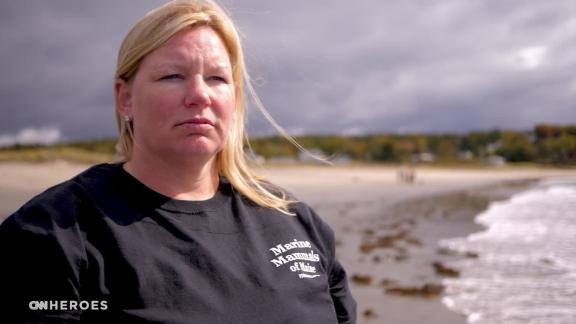When Maine’s seals are in trouble, she gets the call

Growing up in coastal Maine, Lynda Doughty spent a lot of time out on the ocean, where she regularly encountered seals, turtles and whales.
She developed a passion for the marine wildlife living along the coast and knew from an early age that she wanted to dedicate her life to protecting them.
“I just remember being so amazed (by them) and wondering what’s happening in their life,” Doughty said.
She also became aware that their livelihood was jeopardized by pollution, habitat destruction and other human-related activity.
For harbor seals — one of the most common marine mammals along the East Coast — threats include entanglement in fishing gear and other marine debris, illegal feeding and harassment.
“I knew that I wanted to do something to help these animals,” Doughty said.
She became a marine biologist and worked for several years with organizations that provided emergency response and rehabilitation for sick and injured marine mammals. But as nonprofits and state agencies lost funding or closed their doors, Doughty decided to step in and fill the gap.
Since 2011, her nonprofit, Marine Mammals of Maine, has provided response efforts, assistance and medical care for more than 3,000 marine animals.
When Covid-19 struck, Doughty said they couldn’t afford to slow down — the animals still needed their help.
“We were so nervous of what the pandemic might bring and how we would stay afloat as a nonprofit in uncertain times,” Doughty said. “Our team stood strong and we were able to be deemed essential in order to keep our doors open to continue to help and care for animals.”
In March 2020, just as the US began its response to the pandemic, the organization moved into a new, larger facility that allowed them to expand their long-term care capacity to eight seals at any given time.
When another New England-based marine animal rescue program they coordinated with temporarily suspended its long-term animal care amid the pandemic, Doughty’s work became more vital than ever.
“We couldn’t bring any animals to them and there was a lack of rehabilitation spots for animals. So, we were really needed and there was more pressure for our center to stay open,” Doughty said.
The group operates a 24-hour hotline, responding to calls about distressed or deceased marine mammals and sea turtles.
“We are the only organization that’s permitted to respond to marine mammal strandings within 2,500 miles of coastline,” Doughty said, adding that most animals they respond to are seals.
The group has federal authorization to provide temporary care for critically ill and injured seals. If Doughty and her team determine that a seal is not likely to survive in the wild without intervention, it’s transported to their center and nursed back to health.
Staff work closely with veterinarians, who determine the proper treatment for the seals in their care. Most seals require a minimum three months of intensive care before they can be released.
“Any seal that we rescue, the ultimate goal is for that animal to be released back into the wild,” Doughty said.
The nonprofit also responds to calls about deceased seals, whales, dolphins, porpoises and sea turtles. Some are collected to perform a necropsy (an autopsy for animals). The data gathered allows Doughty and her team to further monitor trends in diseases, human impact on marine mammal health, and much more.
The group’s educational outreach efforts further promote marine conservation and stewardship among youth, locals and tourists.
“I feel this intense responsibility to help these animals,” Doughty said. “And really, this is what I was put on this Earth to do.”
CNN’s Laura Klairmont spoke with Doughty about her work. Below is an edited version of their conversation.
CNN: What are some unique characteristics of seals that piqued your interest?
Lynda Doughty: What I love about seals is they really look similar to dogs. They are also really charismatic. They’re funny with their behaviors. They’re really curious, and there’s so much diversity to their populations. They can have all different personalities.
There’s so much unknown about their habitat usage; these animals spend most of their life in the water. Their benefit to the ecosystem is they’re a top predator species and we need that kind of balancing.
CNN: How have humans negatively affected the health and habitat of seals and other marine mammals?
Doughty: There are physical impacts — animals that have been hit by a boat, injured from a propeller wound, entangled in marine debris, or ingested marine pollutants such as plastics. Some other important human impacts that we see is the harassing of marine animals. Being a constant disturbance around areas where marine mammals are can impact their natural behavior and how they conduct their everyday business.
With the increase in human activity on beaches, these animals don’t get time to rest and regain their energy. Or animals are trying to haul out (of the water), but people are trying to push or coax them back in because they think that they need to be wet or in water all the time. Another issue is people trying to get selfies with marine mammals. Taking selfies with seals can actually cause a lot of stress and harm for that animal.
CNN: A lot of your work involves providing long-term care for abandoned seal pups. How can human interaction lead to seal pup abandonment?
Doughty: In the springtime here, there are harbor seal pups that are born along the coast. Once the pup is born, they stay with their mom for about four weeks. Mom usually goes off to forage for food and then come back again. It happens at a time when there’s more people on our shores in general. These animals are getting more and more people coming up to them. What’s concerning is when that could separate a seal pup from its mother.
If she sees the increase in human activity where her seal pup may be, that can increase the chances of a pup abandonment. If there’s people that are around that pup or pick up and move that pup, too many people trying to get a picture of them, the mom may not come back; she kind of saves herself before she saves her pup. And once the abandonment occurs, that seal pup is not going to survive.
CNN: Why are the educational and research components of your work so important?
Doughty: A lot of our education outreach is really explaining to people about marine mammals in general and what they should and should not do if they encounter these animals. We’re trying to reduce impacts, where the animals are not being surrounded by people all the time. The goal is providing them the information, so they know how best to respect marine mammals.
Marine mammals are really sentinels to our ecosystem, and what’s going on in the ocean and our waters impacts us. So, learning from them really helps us understand more about what’s going on in our world.
Want to get involved? Check out the Marine Mammals of Maine website and see how to help.
To donate to Marine Mammals of Maine via GoFundMe, click here



